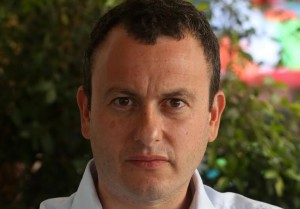Very few ambassadors make headlines in the countries where they are posted before they set foot in them. Matthew Gould is an exception to the rule in that he is Jewish, and thus made history as Britain’s first Jewish ambassador to Israel.
Much was made of this before he took up his position four years ago, but perhaps more should have been made of the fact that he had previously been deputy chief of mission in Iran, where he made a point of visiting Jews and attending synagogue services.
Gould was no stranger to Israel when he arrived. His grandparents had brought him on a tour of the country when he was eight or nine and he came back on holidays while a student and after completing university. His big regret is that he didn’t spend his gap year in Israel, and he is envious of students who do.
In Britain, almost everyone who is principal private secretary to the foreign secretary more or less gets to pick the country to which he will be assigned. Gould was parliamentary private secretary to both David Miliband and William Hague. He and his bride, Celia, chose Israel, “because it mattered to us personally; because it’s a fabulous country in which to live; and a fabulous place in which to raise a family.”
Their two infant daughters, Rachel and Emily, are sabras and next year when they go home to England with their parents, they will be taking with them a sabra dog and a sabra cat. In October this year, the Goulds celebrated their fifth wedding anniversary.
The Goulds came to Israel via Auschwitz, and were “chilled to the core” with the profound realization of what had happened there. Gould’s grandfather, whose original family name was Goldkorn, was born in Warsaw, one of 10 siblings. He, a brother, and a sister went to England, but all the remaining family perished or were murdered.
In his residence in Ramat Gan, Gould has a large portrait of his great-grandfather, a bearded, benign looking Ger Hassid. In fact, one wall is adorned with photographs of both sets of great-grandparents, and another with an old map of Jewish East London.
Asked whether his time in Israel has impacted on his Jewish identity, Gould tells The Jerusalem Post that he has a acquired a much deeper base knowledge and Jewish consciousness, particularly because in Israel “religion and identity are so tied up with politics.” He’s had to read up lot on issues of Judaism and says that it’s a privilege for him to get know more strains of Judaism than those with which he grew up in London.
He meets frequently with haredi representatives of the hassidic, Litvak and Sephardi demographic mosaic.
Their Auschwitz visit prompted the Gould’s decision to do something to benefit Holocaust survivors in Israel. Speaking to then-minister for social services Isaac Herzog and in conjunction with the Joint Distribution Committee, Gould came up with the idea of setting up a network of social clubs for Holocaust survivors.
“It’s a tragedy when people get old and live in pain and solitude,” says Gould, but when they also carry the burden of having been a victim of the Holocaust “it’s a double tragedy.”
In 2011, Gould and his wife, together with then-Israel ambassador to the Court of St.
James Ron Prosor, launched an appeal in the UK Jewish community to raise money for the social club project. On visits back to England, Gould has continued the fund-raising effort, raising over $2 million to enable more than 1,600 Holocaust survivors to regularly attend the clubs.
During Succot, the Gould family hosted Holocaust survivors in their succa, which had been decorated by members of Akim, the national organization for adults and children with intellectual disabilities.
The Goulds attend many Akim events.
What is perhaps amazing is that the Goulds have any time to themselves. In any given week, they host breakfast meetings, seminars, luncheons, receptions, and dinners at the residence, all as part of the ongoing enhancement of bilateral relations.
The residence has guest rooms and the Goulds often have visiting British politicians, high-ranking military personnel, and leading academics staying with them, and sometimes accompanying Gould late at night when he walks the dog.
Gould is very pleased that Prime Minister David Cameron and Labor Party leader Ed Miliband visited Israel in quick succession, demonstrating the “burgeoning partnership” between the two countries.
Gould confesses that he is somewhat concerned about the high incidence of anti-Semitism in England, but is proud of the fact that almost all surveys show that Britain is one of the least anti-Semitic countries in the world. He is also pleased that Cameron and Miliband say much the same thing in their opposition to anti-Semitism and that the British government has taken a clear position and action with regard to anti-Semitic manifestations.
He does acknowledge however, that Britain’s Jewish community feels under pressure, a feeling that was intensified this past summer during Operation Protective Edge.
Gould is also somewhat uneasy about the non-binding British vote for a Palestinian state. The outcome of the vote is not going to change policy, he says, underscoring that Cameron has clearly stated that Britain would recognize a Palestinian state only after the successful conclusion of negotiations. However, the vote does indicate which way the wind is blowing and he does worry about how this will affect Israel’s relationship with the world as it “is losing the center ground of public opinion.”
Gould was supposed to complete his term this year, but asked for an extension for another year. Many ambassadors who have fallen in love with Israel, and have made many friends here, return for vacations afterwards. Will Gould be doing the same? “Absolutely” – he has relatives here as well as friends.

